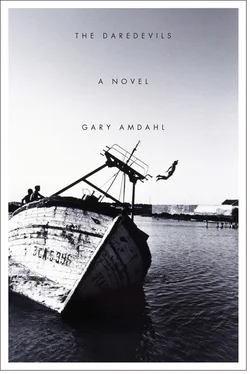Gary Amdahl
The Daredevils
for Leslie Brody, who inspired this novel’s first draft in 1984, and who refused to let me give up on it, even when I suggested I would burn it and myself up before I returned to it, even when there was an actual burning of one draft — even when I threw another draft out with the garbage, retrieving and saving that ream and actually hiding it from me, with the help of our late great friend, the poet, writer, and teacher Joan Joffe Hall, who sent it to me ten years later, and to whose memory I also dedicate this book.
“Hand this man over to Satan immediately,
so that we may save him later.”
— The First Letter of Paul to the Corinthians
“. and it turned out that not from cunning and not
from fear were they so hushed within themselves,
but from harkening.”
— Rainer Maria Rilke, Sonnets to Orpheus, #1
“A life is manly, stoical, moral, or philosophical, we say, in proportion as it is less swayed by paltry personal considerations and more by objective ends that call for energy, even though that energy bring personal loss and pain. This is the good side of war, in so far as it calls for ‘volunteers.’ Even a sick man can willfully turn his attention away from his own future, whether in this world or the next. He can train himself to indifference to his present drawbacks and immerse himself in whatever objective interests still remain accessible. He can follow public news, and sympathize with other people’s affairs. He can cultivate cheerful manners, and be silent about his miseries. And yet he lacks something which the Christian par excellence, the mystic and ascetic saint, for example, has in abundant measure, and which makes of him a human being of an altogether different denomination.”
— William James, Varieties of Religious Experience
“Fear. invites the Devil to come to us.”
— Robert Burton, The Anatomy of Melancholy
PART ONE:THE TRUTH A AND THE FALSEHOOD B : THE OLD STAGE SET COMING APART AT THE SEAMS
Two boys squatted together on either side of an open limelight box. They were adjusting the mixture of gases entering it, with an intensity of care — both nodding silently as if at the idea of it — that was preternatural. The block of lime began to glow, and the light grew brighter and brighter until it seemed it could become no brighter, not in this world, and still it grew.
But then the older boy’s sense of care appeared to slacken while the other boy’s intensified — perhaps in compensation. Both boys felt this change with a shiver.
The older boy went down the main aisle and climbed up on the small stage, across which the curtain, depicting a tranquil northern lake, was drawn. He was wearing a false auburn beard that was much too big for his face, a monocle, a cream-colored suit that was his size and which in fact he owned, and a bowler hat that was also comically big, forcing him to tip it stylishly to one side to keep it from interfering with the all-important monocle. Because the side flaps of the limelight box had not been clapped in place, light was not focused on him but filled the entire theater. He saw the other boy, who was closest to the source, in a heavenly, deathly light that disturbed — even perhaps, in the strict medical sense of the term, shocked him: hellish and heavenly and dead and alive and perfect. It was one kind of light but another as well, a light that was even stronger, even stranger: he thought it must be a kind of hallucination or a kind of madness. He did not feel well. And yet he was able to make a bizarre distinction and say that neither did he feel unwell.
His friend, who was the son of the plumber who ran the gas for the theater, wore a greasy newsboy’s cap that hung down over the sides of his face like the floppy ears of a hound, and a pair of short pants that were comically large: held up by braces, they were like a stiff gabardine barrel into which he’d climbed to hide himself, the top crossing his bare suspendered chest, the ragged hems brushing the floor and under which his toes peeked out. He had a fat, wet toothpick in his tiny pursed mouth, so that from the stage, in that incredible light — light the older boy perceived now as “sensitive,” so sensitive it picked up motes of dust and magnified them — he appeared to be smoking a cigarette or small, fancy cigar.
The older boy watched the other as intently as the other watched the flame. He positioned himself exactly center stage and let himself be hypnotized. The light was a host or vector of some kind of fever, a means of generating or regenerating through fever a superior or at least supernatural life.
Father had said: it was only acceptable temporarily, for a very brief time, to be susceptible to that kind of day-dreamy indolence or outright weakness of mind, if that was how you insisted on seeing it, if at the same time you were reconciled to the unspoken but daily admonition that the only transformative powers to which a man, Charles in this case, might aspire were political, Christian, and expensive.
“I am wearing this disguise for no particular reason,” he announced.
He was speaking loudly and clearly, but in a special way, as if performing. Was he performing? He mused in a satisfied way. He was sure he could pass for twenty in the disguise, even though he was a little short yet — and, most importantly for the immediate artistic concerns, his voice had not yet broken. He tapped the jeweled end of a walking stick in the palm of his hand, as if he was waiting impatiently for his friend to do something. And there it was again: Performing? If so, for who, and why?
Toulouse-Lautrec, he wondered. Was that who he was thinking of? I need a sketch pad. His voice was sure to break any minute. He did not know if he wanted it to happen or not. If Mother intends to castrate me, she has got to act now, he thought. I’m joking, he thought. Right? How good, really, is my voice? Good enough for Mother to want to cut my balls off to save it? How many times had Mother said, “You can never find a castrato when you need one”? Many, many times. If Mother thought someone had failed to catch her witticisms, she would back her horse up and gallop over them again.
It was the finest treble San Franciscans had heard in a generation of boy choirs. How many times had Mother said so? How many times had people owing nothing to Mother, under her influence in no readily apparent way, said so?
Many, many times.
He could sing well.
He knew it was true, even if he refused comment. It was an accident of evolution. Not the right word, he knew, but that was how he saw it: it had come down through the ages, a million years of yodeling homo this and homo that and landed in his pristine voice box. He believed it — the essential, ideal Voice — had reached its zenith in Mother’s contralto, but he was her baby. His brothers and sister could sing — as certainly could Father — but not like he could, not like Mother could.
An accident. Or gift from God, depending on whom he was talking to and what kind of mood he was in. And just as Plato said would happen to an ideal, it was degenerating — even as he spoke! He had to laugh at that one, and in the peal of that angelic laugh he thought he heard the first creak of a shiver of a crack beginning to form, his perfect little larynx beginning to bulge and thicken and coarsen.
Mother? Sharpen the knife.
He called out to Little Joe who was still muttering and tinkering with the limelight: he told him he thought it was funny. In a distracted stage whisper — incredibly enough, Little Joe seemed to be performing too — faintly annoyed perhaps, or even “faintly annoyed,” the toothpick stretching the corner of his mouth, Joe asked Charles what it was he thought was funny, and did he mean funny strange or funny ha-ha.
Читать дальше












